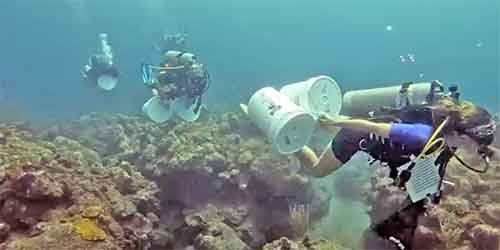Researchers from Van Hall Larenstein University of Applied Sciences have released laboratory-reared Diadema antillarum sea urchins onto Saban reefs as part of an innovative coral reef restoration experiment.

The initiative represents a significant step forward in reef restoration research, one of the university’s key research themes, which focuses on developing and testing more effective methods to restore damaged coral reef ecosystems.
Novel Acclimation Strategy
The research team employed a unique three-pronged approach to urchin deployment. Some urchins were transferred directly from laboratory conditions to the reef environment, while others underwent acclimation periods in two different cage designs—traditional lobster cages and specialized wire cages—before release.
This experimental design addresses a critical challenge in marine restoration efforts. Previous attempts at restocking lab-reared urchins have shown limited success, potentially due to morphological differences and altered shelter-seeking behaviors that develop in laboratory conditions compared to their wild counterparts.
“By testing whether a short acclimation period in cages improves survival and retention on the reef, we’re exploring whether we can bridge the gap between laboratory and wild conditions,” explains the research team.
Monitoring and Assessment
Over the coming weeks, researchers will conduct comprehensive monitoring of the released urchins, tracking their behavior patterns, movement across the reef, and overall survival rates. This data will be crucial in determining whether the acclimation strategy enhances the success of restoration efforts.
The Diadema antillarum, commonly known as the long-spined sea urchin, plays a vital ecological role in Caribbean reef systems by controlling algae growth and maintaining the delicate balance necessary for coral health and growth.
Collaborative Research Effort
This experiment forms part of the broader Diadema II project, supported by an extensive network of research institutions and conservation organizations, including:
- Van Hall Larenstein University of Applied Sciences
- STENAPA St. Eustatius
- Wageningen University & Research
- Saba Conservation Foundation
- Reef Renewal Foundation Bonaire
- ISER Caribe
- Nationaal Regieorgaan Praktijkgericht Onderzoek SIA
- Nature Foundation Sint Maarten
The collaborative nature of this project underscores the regional commitment to Caribbean reef conservation and the importance of cross-institutional partnerships in addressing complex marine ecosystem challenges.
For updates on this research, visit: https://www.facebook.com/reefrestorationVHL
This research contributes to ongoing efforts to restore Caribbean coral reefs, which face mounting pressures from climate change, ocean acidification, and human activities.
 Saba News News and Information from Saba Island, Dutch Caribbean
Saba News News and Information from Saba Island, Dutch Caribbean
